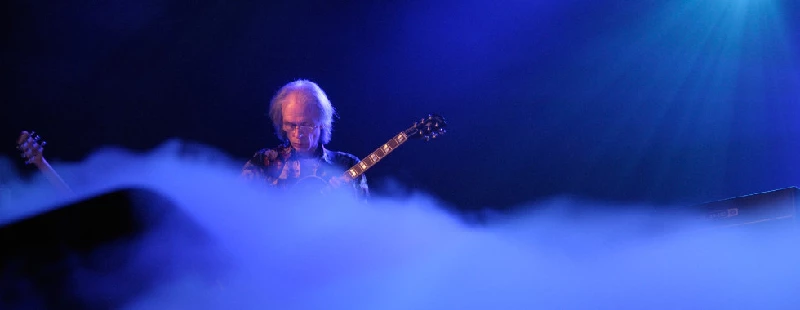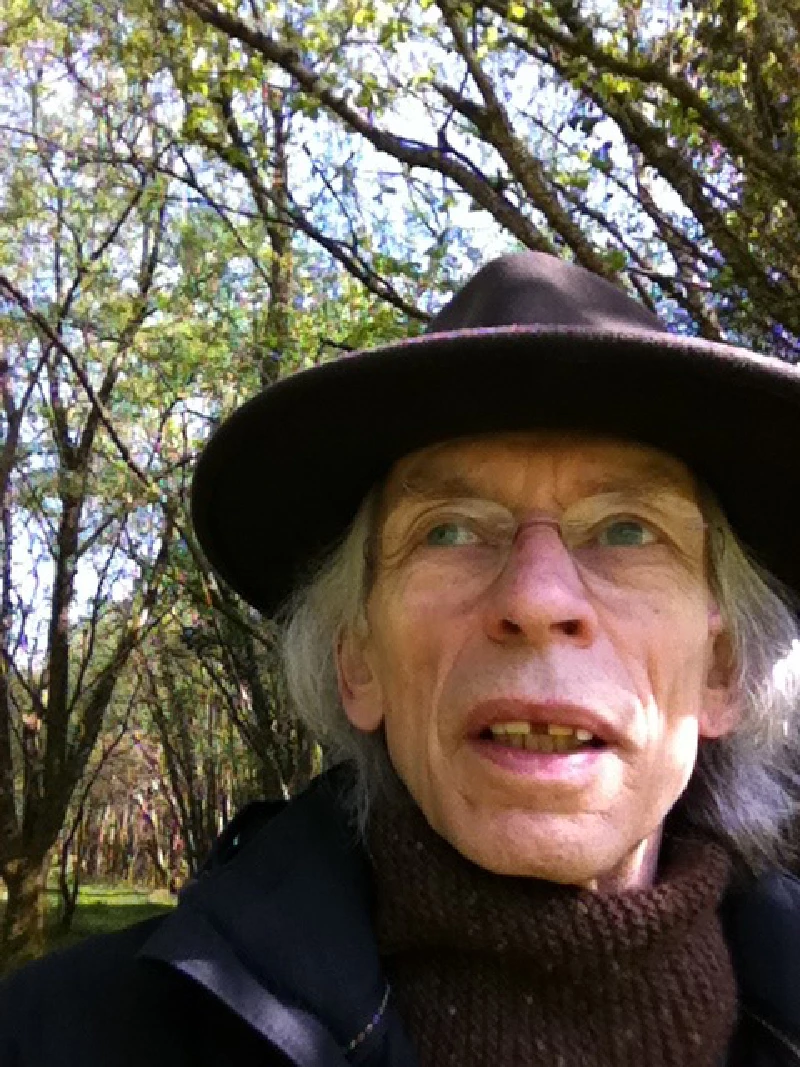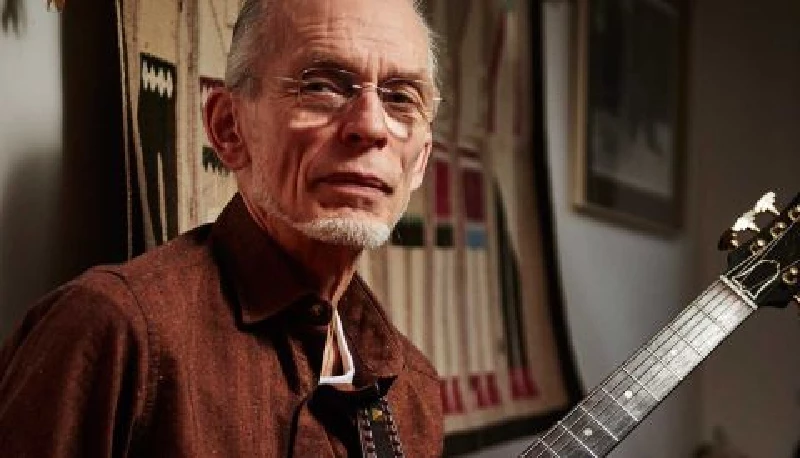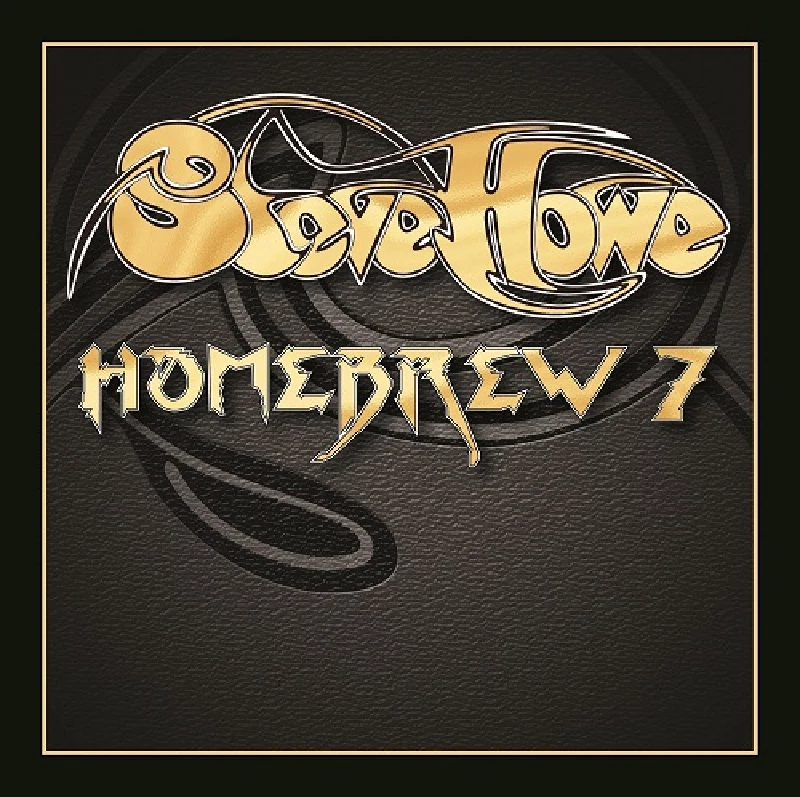Steve Howe is one of the grand masters of prog rock through his universal wizardry as a vital member of Yes and his ability to co-exist as a power balladeer with Asia…bands of which he remains an integral part. But long before, however, he transformed Yes from psychedelia to fantasy and wizardry, he played Shadows covers when his band held a residency at Pentonville Prison. Pennyblackmusic asked Steve Howe about his ascension to rock royalty, his non- stop musical directions, the latest and seventh album in his solo ‘Homebrew’ series and his devotion to transcendental meditation. PB: I know you’re a very busy guy with plenty going on, so let me just clear one matter up first. You are perhaps not as sprightly as you were in 1968 but you show no signs of slowing down…are you really Benjamin Button? SH: Benjamin Button? (Laughs) Isn’t he the guy who gets younger the older he becomes? PB: That’s him… SH: Well, I can’t really say. There are things that you do and you just get on with it, and you can be lucky and not so lucky ,but basically I feel good and I still love my music. I love the sound of the guitar. I love my family and I get on with life. That’s all I'm doing…so just call me Benjamin! PB: You have released a huge compilation boxset ‘The Reunion Albums’ witah Asia. That’s your three albums released with them in the noughties plus two live DVD albums. What was behind that decision to re-release all that epic material? SH: Well, after I released my last solo album ‘Love Is’ with BMG, it helped to open the door up where BMG started to appreciate other things we had on offer and one of the projects was the three reunion albums with Asia. ‘Phoenix’, ‘Omega’ and’ ‘XXX’ were basically available and we did a live show in Japan, so the whole thing got beautifully packaged and it’s one item now. It was just a case of tidying up affairs really. PB: Did you need to get back with any of the guys to organise it, or was it just done remotely? SH: There were discussions between, the three surviving members, Geoff Downes, Carl Palmer and myself and we obviously considered John Wetton’s estate very seriously. The discussions went well and we took input from everybody about what we liked. There has been no touring, so we had more time to think about exactly what we all wanted to achieve PB I hear that Asia are possibly touring next year. Do you have any thoughts of re-joining them or are you too busy? SH: I don’t know that there is anything official yet, but I know it’s an anniversary year and there may be something going on but I'm not committed to anything. But that does not mean to say I wouldn’t do something. Let us wait and see. “Bumblefoot” Thai did a great job the other year on the Asia tour, actually doing John’s job. He’s an amazing singer and guitarist, so if I'm not there he will be, and I'm happy with that. PB: When I said you were busy I was referring to your constant workload. You’ve been producing your own ‘Homebrew’ series for the past 25 years and have just released ‘Homebrew 7’. Is it all brand new material as I've never heard or seen any of those tracks before? SH: More or less. Yeah. Basically I have this sort of sweeping backlog of music that exists. I was quite happy with it but it was not going anywhere. It wasn’t going to be redeveloped or rearranged, and nor were Asia going to play it. I felt that it was better to put it out. so I invented a new version of ‘Homebrew’ which is usually music that has been out in some other way, but this time it was a fresh start, except for ‘Halfway’, which does have a history. Most of the tracks are hidden secretive bits of music and some of them are very, very dear to my heart, particularly ‘A Lady She Is’ and ‘Outstanding Deal’ . Most of the tracks are very close to me. I feel very warm about them, as quirky as some of them are. Several of the tracks date from the late 70’s or the early 80’s. I write a lot of music and it’s just finding the right kind of outlet. I thought that ‘Homebrew 7’ should be a difference from the other six and feature music that’s not been heard before. PB: Where did you find it all? Do you have it all on various tapes locked away in a safe? SH: They are from all over the show. One or two of them were recorded on stereo, like ‘Another Day’, which is a voice and guitar live recording. Some are on quarter inch tapes, some are on DAT, minidisc, hard drives. Some are even on 8 track. So what happens with ‘Homebrew’ is that I usually I have to start researching to get a package of music together but this time it was really different because I didn’t have a criteria about building a story. This time it was just random. I just found an order that pleased me to some extent. Basically, the idea with it is that it is another look at different songs. Some were probably always on the periphery of my mind…the ones that I always thought should be recorded but never were. Most of it was recorded at our studio in Devon. PB: Have got enough stuff for the next one, ‘Homebrew 8’? SH: Yeah, there is always more. PB: Changing direction slightly, over the years you must have done hundreds of interviews, most of them concentrating on your significant contribution towards the music of Yes. So I’ll touch on more from less well trodden ground, of course without mentioning William Shatner’s album which you had something to do with. We’ll keep that on one side. SH: Ha, although I played on it they didn’t use my guitar. I was quite irritated by that but I thought, “Hey, if they didn’t want to use my guitar and still pay that’s just fine.” But yeah, we’ll go away from that. PB: When you were fourteen you played your first gig at The Swan Hotel in Tottenham. Do you recall anything of that night? SH: Well, I don’t specifically recall the first night but I remember it became a kind of residency and went on for a whole year. I got the whatever bus it was that went from Holloway to Tottenham every weekend three days of every week, Friday night, Saturday night, and two sets on Sunday. I was really shy but that was a great learning curve for me. I was underage, but I didn’t look underage so they never asked me so I might have had a beer or two, That gig went on and on, then we went to another pub, also I think called The Swan. I can remember lots about that. We used to practice in a room at the back where we had to update our track list ,so we had the latest Shadows songs and other poppy instrumentals. I go back there in my mind quite often. I loved those days in The Swan except for the Saturday night brawls, when I needed to hide and protect my guitar and make sure nobody was going to come anywhere near me. That just shows you the downside of drinking. It makes people aggressive, and a lot of the stupid crimes that happen in this world are because of the legality of alcohol. I stopped drinking myself more years ago than I can remember because it doesn’t agree with me and it doesn’t make me a nice person. PB: I believe you had a residency at HMP Pentonville. is that right? SH: That was really early on in about 1962. I recall that I had a Watkins Dominator amp and it was really loud and we used to play in this canteen – I don’t know what time of the week it was, Tuesday night or something, and we used to play pop songs and instrumentals and everything by The Shadows. It was quite intimidating. We started to back up our gear as soon as the prisoners came in. PB: I believe when you were over in America and people started to pay huge auditoriums you realised that the sound quality that you were producing wasn’t really appropriate for large venues. Remember The Beatles at Shea Stadium, for example, you couldn’t hear a thing…apart from screaming. I understand that you played with Iron Butterfly and acquired the PA system and became the daddy of stadium rockers, thereafter. SH: That’s right, when we did the ‘Yes’ album we were offered a tour in the UK with Iron Butterfly. We were so impressed with their PA and couldn’t believe how good it sounded. It was better than any other system we had ever heard and it was absolutely brilliant. So, when the tour ended we said to them, “Can be buy the system?” . It was most probably illegal over here but they said, “Yeah you can buy it,” and it was £5,000 and in 1970 £5,000 was a fortune. So, we scraped the money together and bought that system. We were very proud of that system when we went out on the ‘Fragile’ tour. Until other bands wised up, we had the best PA in the UK. PB: Now, you can swerve this next question if you wish to, but Yes was probably the greatest Prog Rock band of all time, pioneers of the genre, with music that was both complex and intelligent – what part did pharmaceuticals play in the creation of that kind of sound? SH: By the time the 70’s came pharmaceuticals were a joke, I mean nobody in their right mind would take speed or those sleeping tablets, but quite often that’s what happened. I think by that time there were places you could go and have fun but those were places to avoid. Yes was a very mixed up band. Some people liked to get drunk. other people liked to get high and anything might go on in between but basically our rule, which was sometimes broken, was don’t go there, keep clear and don’t mess with anything bad. That wasn’t always the case but in the majority of times at least three or four of us were pretty level-headed if not a little out of it occasionally! PB: In ’76 punk happened and you were the very antithesis of that punk movement. Did punk affect the way you created music after that? SH: I think it did in some way but we more likely took note of how Heavy Metal was developing. There was a bit more raunch in Yes in the mid to late 70’s, but there again having Trevor Horn and Geoff Downes in the band at that stage made it very modern. We had much more of a modern sound than being the sort of retro psychedelic band which I think we were up until then. You can’t ignore fashions but there was other competition besides punk to us. It was all the bands that were like us – there were ELP, Genesis and Pink Floyd. We had competition but obviously punk wasn’t really our competition directly but it changed the way some people thought about us, which was disappointing. In that year we went from being ‘The People’s Band’ in the ‘NME’ and then a year or two later we were rock dinosaurs there (Laughs]. We laughed. I’ve always been able to take criticism. PB: In ’88 you appeared on Billy Currie’s album, ‘Transportation’. Now Billy is the guy that seems to crop up everywhere when I'm doing interviews – how did you link up with him? SH: I was looking for a studio to do ‘Turbulence’ in, and he invited me to play on his album through an acquaintance. I went down to the studio and I liked his music immensely. He didn’t just say to me, “Just plug in and play.” He directed me a little which I really appreciated. I like people who know what they are looking for and just get on with it. He was instructive and helpful and useful. We struck a deal where I played on his album for free and he played on my album for free. That worked out great. PB: Excellent. Now even more diverse than Billy Currie, you worked with Frankie Goes to Hollywood on ‘Welcome to the Pleasuredome’ – that’s a bit leftfield for you, isn’t it? SH: Trevor Horn was part of Yes in the late 70s (after he had become well known with Buggles). I liked working with Trevor, who was a major producer and we were good friends. I would often pop in and see him just out of the blue. On one occasion he asked, “Have you got a guitar?” and I said, “ I've got one in the car,” and he said “Can you play on this?” [Laughs]. So, it was all really spontaneous and before I knew it I was playing with Frankie Goes to Hollywood. I loved it so much. ‘The Power of Love’ and that album were sensational. The bits I did were really good fun so Trevor utilised me anytime he wanted, if I was available. I did things I never heard again really but also one of the most amazing things was when I played for Malcom McLaren who was doing an album, and Trevor called me and said, “We don’t have anybody that plays the washboard. Do you?” And I said, “Yes, I play the washboard, I will bring my cymbals down with my washboard.” So, I went down Trevor’s studio and played washboard on a McLaren track. I can turn my hand my hand to most of the guitar family, and I also play a couple of rather obscure instruments. PB: One thing I didn’t know before I researched this interview was you had an interesting relationship with Brian May and Freddie Mercury and they invited you to play Spanish guitar on ‘Innuendo’. Tell me more? SH: I was in Switzerland during the early 90’s staying near Geneva. One day I drove to Montreux, as I had done quite a bit of recording there in the past, I was sitting in a restaurant, a lady walked by and went, “Hey, Steve, what are you doing?” and I said I was just having lunch and she said, “Well, come down and see me and meet the guys.” She was working with Queen. By the time I arrived at the studio to see them, they had decided to ask me to play on ‘Innuendo’. They played all the other songs on the album to me and I was totally blown away, and then they played ‘Innuendo’ last and said, “Can you add some guitar to that?” It already sounded great so I asked them what they wanted. It turned out that they wanted something that went on top of Brian’s guitar. So I agreed and after a few hours we laid down the Spanish guitar piece and we were all delighted. PB: What an interesting life you lead. You’ve had a long connection with Roger Dean as well, haven’t you, and from the beginning of the Yes days until recently? SH: Yes, everything we do should and has always involved Roger. He is a fine artist and he is still full of originality, and his own distinct style comes through all the time. We’ve been good forever. He was on tour with us in 2019 with a kind of gallery of the gig and he was almost like another member. PB: Finally, Steve, this is perhaps an all-encompassing question – you’ve practiced Transcendental Meditation for many years now. What effect has that had upon you and does it affect your music and your personal life? SH: I don’t talk about it a lot but it is very important to me and I am very pleased that since 1983 I have been finding the time every day to do it. I use it before concerts and it has really cleaned up my act. I rely on TM as my preparation. So, in fact I used it for clearing my mind before the show and settling down and when I am finished I like to get on stage fairly soon after and not have any distractions. Nobody is allowed to come up and ask me anything really [Laughs]. Meditation, whatever one you choose, is something of an investment. It doesn’t give you an instant result. it’s not an instant buzz. You don’t get high on meditation. It helps to control your ambitions and goals and affections in a way that most probably nothing else can really do so. Not only does it help your mind but helps your body. Not that I read scientific evidence to prove anything or to suggest why it is, but apparently there is some evidence to say that it actually helps to keep your body younger as you get older. It is something that if you enjoy it and you can find that you can give it your attention then it is very beneficial. TM is quite unique in that you can’t learn it from a book. You learn at a centre. I learned it with other people in a room. I wasn’t taught solo. I think it has helped my music just because I am seeing things on a level playing field, I'm not up one minute and down the next. PB: Thank you
Band Links:-
https://stevehowe.com/https://www.facebook.com/guitarrondo/
https://en.wikipedia.org/wiki/Steve_Howe
Play in YouTube:-
Have a Listen:-
Picture Gallery:-




intro
Prog rock pioneer and Yes and Asia guitarist Steve Howe talks to Andrew Twambley about his long career and the latest and seventh album in his solo ‘Homebrew’ series.
soundcloud
most viewed articles
current edition
Spear Of Destiny - InterviewRobert Forster - Interview
Fiona Hutchings - Interview
When Rivers Meet - Waterfront, Norwich, 29/5/2025
Carl Ewens - David Bowie 1964 to 1982 On Track: Every Album, Every Song
Brian Wilson - Ten Songs That Made Me Love...
Pistol Daisys - Waterfront, Norwich, 29/5/2025
Nils Petter Molvaer - El Molino, Barcelona, 24/4/2025
Credits - ARC, Liverpool, 17/5.2025
Gary Numan - Berserker
previous editions
Heavenly - P.U.N.K. Girl EPDwina Gibb - Interview
Boomtown Rats - Ten Songs That Made Me Love....
Oasis - Oasis, Earl's Court, London, 1995
Sound - Interview with Bi Marshall Part 1
Trudie Myerscough-Harris - Interview
Serge Gainsbourg - Ten Songs That Made Me Love...
Susie Hug - Interview
Chuck Prophet - Ten Songs That Made Me Love...
Ray Humphries - Interview
most viewed reviews
current edition
Peter Doolan - I Am a Tree Rooted to the Spot and a Snake Moves Around Me,in a CircleGarbage - Let All That We Imagine Be The Light
Little Simz - Lotus
Suzanne Vega - Flying With Angels
John McKay - Sixes and #Sevens
Billy Nomates - Metalhorse
Vinny Peculiar - Things Too Long Left Unsaid
HAIM - I Quit
Eddie Chacon - Lay Low
Only Child - Holy Ghosts
Pennyblackmusic Regular Contributors
Adrian Janes
Amanda J. Window
Andrew Twambley
Anthony Dhanendran
Benjamin Howarth
Cila Warncke
Daniel Cressey
Darren Aston
Dastardly
Dave Goodwin
Denzil Watson
Dominic B. Simpson
Eoghan Lyng
Fiona Hutchings
Harry Sherriff
Helen Tipping
Jamie Rowland
John Clarkson
Julie Cruickshank
Kimberly Bright
Lisa Torem
Maarten Schiethart